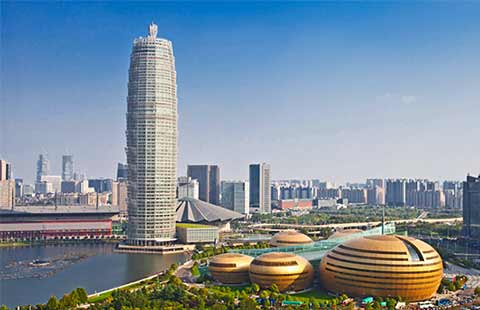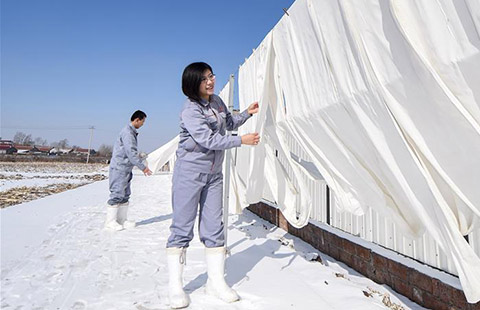Olympic ideal helps companies go global
(chinadaily.com.cn) Updated: 2012-09-12 16:39Host: We have obtained support from foreign governments and the local people as well. I also want to know the biggest dilemma you've met during the Alliance's overseas expansion.
Feng: Well, there is no such big thing as a "dilemma". Our alliance chooses only one company from one industry, so some people are not well informed of it.
Some people think it's a Don Quixote move, saying we are doomed to lose. Actually, it's not. We are going overseas as a union, in a group.
The problem is that we used to think that we will not be well received by foreign people. But the fact is we are warmly welcomed, and it's us that move slowly. The local people are very hospitable, sometimes making us a little bit embarrassed as we are not prepared for that.
When we, a group of 50 entrepreneurs, visited Belgium last time, the government employed eight police cars clearing the way for us. We were received by the country's prime minister, prince and princess. But our (investment) moves are too slow. Some companies decided to invest there, only to find they are lacking in talents for such moves. Ironically, many students who have studied abroad cannot find jobs at home.
So the problem lies in the influent information exchange, and we have no platform for internationalization. I really hope China Daily can serve in this respect, as you are a bridge between China and the rest of the world, though the newspaper mainly targets overseas readers, and the number of domestic readers may be limited.
I think internationalization is an opportunity for all, just like the situation for Internet companies during 1997 to 1999. Anyone who started their businesses in the sector during those days enjoys their success today. Robin Li (of Baidu Inc) has become China's richest man; Zhang Chaoyang of Sohu, one of my school mates, has now expanded his business.
Interestingly, many big companies missed the chance at that time, but startups like Li and Zhang grasped the opportunities and steadfastly strengthened the whole industry.
At the same time, China's GDP per capita is less than one tenth that of Western Europe. The Chinese are so industrious, diligent, and intelligent, the only thing they need is to go to the outside world.
It is really quite risky and costly for us to explore the overseas market by ourself. It's no easy thing for a newcomer to an unfamiliar place, especially when you break local laws, which will cost you a lot. So we decided to go out in a group. It's less risky and local property developers are eager to accommodate us because we are a group of well-behaved companies. It's like the Olympic Village welcoming athletes from around the world.
Let's take the Chinese brands as a group of athletes in the Olympic Games. The 10,000 athletes led by Juan Antonio Samaranch were warmly welcomed by Chinese people. So the group of quality Chinese brands will also be well received in the foreign market. So it's key for these brands to join together as a group.
At present, many people are not aware of the alliance, because we only recruit one company in one industry, and people are less informed about those involved in a different industry.
I am busy running business abroad, only communicating with friends via micro blogs. But many entrepreneurs cannot spare time checking micro blogs. So the message does not spread widely. I hope China Daily can help in the respect, and our audience can pass the message to decision makers in their companies, especially those who want to brand their companies.
We invite the top 3 companies of each industry to join our alliance, and those selected will be the alliance's one and only in his industry.
You may ask what about the others? They can join our Club. Even if you are not one of the top 3 players in your industry, or just a small- and medium-sized company, you can be a member of our Club, which offers opportunities for SMEs to learn from the big companies in our alliance.
We organize 10 conferences each year to share information on internationalization. The top 3 players selected in our alliance will deliver lectures.
Companies in the alliance will be our first choice when making overseas forays.
For example, if a company in the alliance decides to expand in Belgium, its peer of the same industry in the Club will have to give up the country but can turn to another country where the Alliance member may be too occupied with its current business to explore. First come, first served.
There are more than 200 countries in the world and few companies can expand their businesses to all these countries. A big company may only tap 10 foreign markets when caring for their robust domestic business. The rest of the 190 countries will be paradise for the SMEs in the Alliance and Club alike. Also, first come, first served.
It's better to focus on one or two countries. A SME does not need to expand its footprint all over the world.
Take Robin Li's Baidu for example. It was just a small- and micro-sized company in the US at first, but it is a big success in China now. It would be no match to Google if it stayed in the US. But as it came to China and focused only on this market, it created a new segment market - search engine specialized in Chinese – there was no doubt that it would win great popularity here.
So for Baidu, the previous small- and micro-sized company from the US, it would only be too glad to be a pride and hero here in China.
So I urge Chinese companies to stop grappling with domestic rivals and to become comrades in arms.
The Alliance members can choose its favorable regions first, its peers in the Club can blaze trails in the rest of the world market so they will not compete in the same market, but become comrades conquering the world market. They can share their resources and exchange what they need, and become each other's agent in his turf.
That would improve the relations between the companies, just like the harmonious atmosphere in the Olympic Family. People will spare more effort to create values instead of grappling with domestic peers, and turn their sights to the outside world outside.
Host: Thank you for introducing and sharing with us the aigo Internationalization Alliance approach. I believe our audience and company decision makers will be eager to join it and contribute their efforts in promoting private Chinese firms' overseas expansion.
Feng: Welcome to join us. We invite outstanding Chinese brands to be part of the aigo Internationalization Alliance or the Study Club.
For a Chinese with a dragon within himself, if they are willing to rally, the joint might make them a giant dragon from the Orient.
- Huawei grows consumer products range across Western Europe
- Xiaomi introduces video call app with US firm
- Asian woes take toll on AIA Group
- Regulator quashes registration-based IPO rumors
- Foxconn casts doubt on Sharp deal
- Products presented at MWC in Barcelona
- Industrial diversity pays benefits for local economy
- 'Invented-in-China’ products to the fore at MWC
















